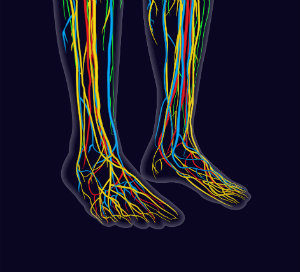


 We treat patients for many different conditions, but one of the most concerning is nerve damage in feet. Neuropathy is a condition wherein your peripheral nerves—the ones responsible for recording information and communicating it back to the spinal column and brain (your central nervous system)—are damaged. This can become an emergency situation when an untreated minor cut or sore breaks down over time and becomes an ulcer.
We treat patients for many different conditions, but one of the most concerning is nerve damage in feet. Neuropathy is a condition wherein your peripheral nerves—the ones responsible for recording information and communicating it back to the spinal column and brain (your central nervous system)—are damaged. This can become an emergency situation when an untreated minor cut or sore breaks down over time and becomes an ulcer.
Neuropathy is a concern no matter where in the body it develops, but nerve damage in the feet can be particularly alarming for a couple of reasons. First, your feet endure tremendous force loads on a daily basis, which puts them at heightened risk for injury and medical conditions. Second, feet are generally not particularly visible. Our lower limbs are often covered in socks and shoes, plus they are the furthest points on the body from our eyes. This means you have to be vigilant to catch those issues that can become medical emergencies if you have neuropathy!
Whereas neuropathy is commonly associated with diabetes—and rightfully so given that 60-70 percent of diabetic individuals will develop nerve damage during their lifetime—there are several other potential sources, including:
If you have sustained nerve damage in your feet that is causing problems like burning, tingling, or painful sensations, or you are unable to feel anything, come see us here at our Bloomington, IN office. We will determine the root cause of the problem and then create an effective treatment plan for you. If diabetes is responsible, we can help you develop a diabetic foot care plan to prevent issues from arising in the first place.
Call us at (812) 333-4422 for more information, or assistance in scheduling an appointment that works for you. You can also take advantage of our online form to contact us right now.
The fall season is a time that many hunters have anticipated all year and camouflage gear is top on the list. Blending in with your surroundings is essential in setting up a successful hunting outing—you need the advantage if you want to stealthily move in on your prey. Did you know, though, that you may have dangerous foreign objects lurking and blending in right in your very own home? If you have diabetes, walking barefoot, even in the winter and indoors, exposes your feet to injury.
You may be asking, “So, you are telling me I shouldn’t even walk barefoot in my own house?” For the average person, it is generally safe if you keep a home that is clean and free of clutter. If you have a condition such as diabetes, though, we want you to pay attention here. Nerve damage as a result of neuropathy, is a common condition that accompanies diabetes. If you have nerve damage in your feet, you cannot afford to walk barefoot in or outside of your home. A puncture wound is different than a cut in that it is a small hole in your skin. While it isn’t an open wound, it can be deep and hide a serious injury underneath. Depending on what the foreign object is, it could leave pieces embedded in your skin or leave bacteria behind, increasing your risk for infection. With diabetes, a small puncture wound could very easily turn into an ulcer with serious consequences.
The best way to avoid this is to wear protection on your feet at all times. If you like to wear house slippers, make sure they have a thick sole to protect the bottoms of your feet. Never go outside without shoes—even five steps on your driveway to grab the newspaper. There could be a sharp rock or piece of broken glass and nerve damage could prevent you from even feeling the puncture in the first place—this is a dangerous situation when the injury is unknown and is left untreated.
If you suspect you may have stepped on something sharp or have a puncture wound, stay on the safe side and let us check it out. We’ll make sure it is treated properly and help you toward a safe and effective recovery. Don’t wait! Contact Dr. Kevin Powers in Bloomington, IN at (812) 333-4422 for an appointment today.